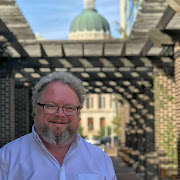Some would say, it’s all Steve’s fault – Stephen Langton. He was really trying to be helpful and, to his credit, he has made the study of the bible much easier. It was the early 1200’s and Mr. Langton was actually Archbishop of Canterbury Cardinal Stephen Langton. (By the way, Archbishop Langton was responsible for the creation and acceptance of the Magna Carta, “The Great Charter of Liberties”, but that’s a story for another time.)
Until this point in history you had to work very hard to study scripture. For one thing, you needed to know either Greek, Hebrew, or Latin (all three if you wanted to get a full understanding of the Old and New Testaments). But, even if you knew all three languages, in the 1200’s most copies of scripture lacked any kind of “address system”. There was no “John 3:16” there was only John, Isaiah, Genesis, etc.
If you knew Jesus had a conversation with Nicodemus, AND if you remembered John was the one who recorded it, then you would open the book of John and scan each paragraph until you found it. You had to work very hard to study scripture and there were no cross-references.
To help make study easier, Archbishop Cardinal Langton added chapter divisions to the bible. Prior to this you simply had the book of Psalms, now you have 150 chapters of Psalms. Before this system was added, Proverbs was one large book; now you have 31 chapters of Proverbs. Finally, after twelve centuries, there were milestones to guide you along the way as you were reading the bible, and bible study became less of a chore.
Three hundred years later a printer named Robert Estienne added verse divisions, and study of scripture became that much easier. Instead of turning to John chapter 3 and scanning the whole chapter, you could jump right to John 3:16.
Jump another 500 years forward and you arrive in 2018. Now you have dozens of translations and interpretations stored in your phone and available at the touch of a button. We have hundreds of reading plans available to us that divide the bible into topics, and some that simply give us the “Verse of the Day,” or as they say in France “Verset du Jour.”
Accessing the scripture has become so effortless you can have scripture read to you while you are driving to work, or taking a shower. You don’t even have to read it for yourself, just keep the soap out of your ears and your eyes on the road.
Each of these advances are truly wonderful. We live in extraordinary times! Our access to scripture, it’s various interpretations, commentaries, cross-references, and maps has become less demanding – which is fantastic … and, also, a drawback. Usually we make very little effort to study scripture beyond a few taps on a touchscreen and, as a result, we frequently miss out on a new richness of understanding; an understanding that was beyond imagination just 800 years ago; before there were chapter numbers. That’s a problem.
For instance, have you ever included John 2:23-25 along with the story of Jesus and Nicodemus found in John 3:1-21? The chapter number “3” might be getting in the way of a new revelation about why Jesus was so excited to talk with Nicodemus.
Consider the unsurmountable barrier called the number “5”. Have you ever noticed that Matthew 4:23-25 really should be included with chapter 5, what we call the beginning of the Sermon on the Mount? Could these verses offer insight into what Jesus was really talking about in the Beatitudes? (By the way, the word “Beatitudes” didn’t make its way into the bible until 1540 – and then only as a section title. “Beatitudes” is not found in the scripture text. But that’s another story for another time.)
Perhaps there are additional places in scripture that invite a closer examination. Could it be that there are other nefarious integers, or combinations of digits, that passively hinder us from a fresh understanding of God’s word? Or is it that we no longer need to labor at tilling the soil of God’s Word, so we don’t make the effort? Have we settled so long, surviving on volunteer heads of grain, that we no longer understand the possibility of a record-breaking harvest of truth and life?
I am thankful for people like Archbishop of Canterbury Cardinal Stephen Langton, who made an extra effort to make my study of scripture easier. Now I can focus my efforts on other areas of studying scripture – like, what does Ephesians 5:16 have to do with Ephesians 6:13? Or, can Luke 6:20-26 help me understand Matthew 5:3-12?
By the way, if it wasn’t for a guy named Steve in the early 1200’s and a guy named Bob in the 1500’s, I wouldn’t have been able to write those last two sentences. Thanks, Steve! Thanks, Bob!
Now, who’s ready to work?
You can find me on FACEBOOK at
my Facebook Page (
http://www.new.facebook.com/profile.php?id=504321719).
Here's a link to
my Flickr.com Page (
http://www.flickr.com/photos/curtisferrell/)
Thanks for reading!







